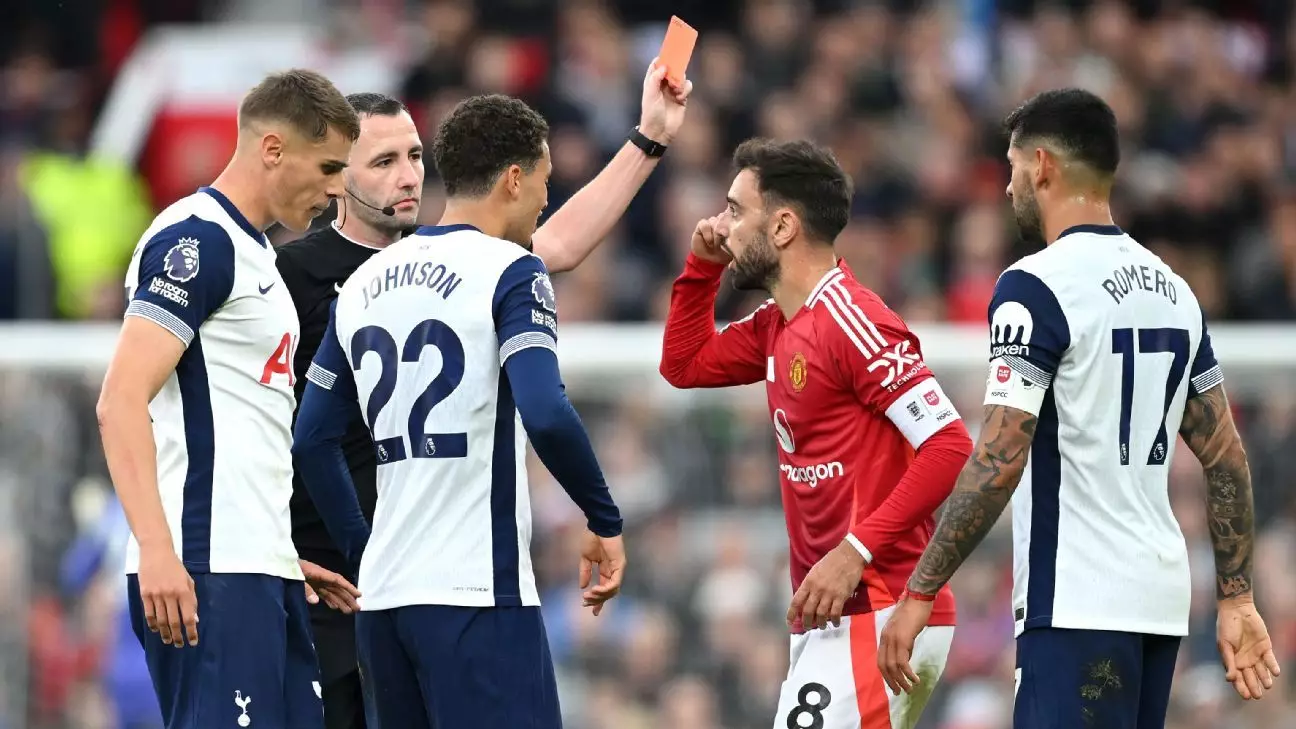In a whirlwind of controversy, Manchester United recently triumphed in their appeal regarding Bruno Fernandes’ red card, issued during their heavy 3-0 defeat to Tottenham. The incident unfolded in the first half when Fernandes, attempting to suppress James Maddison’s advances, unintentionally caught the Spurs midfielder with a wayward leg. Referee Chris Kavanagh quickly issued a straight red card, a call that was upheld by Video Assistant Referee (VAR) John Brooks. This decision, however, sparked significant debate, igniting discussions about the consistency and fairness of officiating in the Premier League.
The ramifications of the decision were immediate and severe for United. Fernandes’ dismissal appeared to have a profound impact on the match, altering the game dynamic and leaving fans and analysts to speculate on the potential outcome had the United captain remained on the pitch. Manager Erik ten Hag noted that the red card “changed the game,” despite the visitors already dominating the first half. This statement opens a conversation about the role of officiating in influencing match results and whether ruling decisions can overshadow the performance of the teams involved.
The Appeal Process and Its Implications
Following the match, Manchester United wasted no time in launching an appeal against the red card, a move that exemplified the club’s determination to protect its players and uphold competitive integrity. The swift response from the FA, which ultimately overturned the original decision, speaks to the complexities surrounding officiating and player conduct in high-stakes matches. The FA’s announcement on Tuesday confirmed that Fernandes would avoid suspension and would be eligible to play in crucial upcoming fixtures against Aston Villa, Brentford, and West Ham.
This appeal’s success not only averts an immediate crisis for United but also sheds light on the broader implications of player safety and referee accountability. In a climate where the speed of decision-making often leaves little room for reconsideration, this incident has renewed calls for a more transparent and consistent approach to officiating. The fact that a player could miss multiple matches due to a potentially unjust decision raises questions about the mechanisms in place to review and rectify such rulings.
Player Reactions and Future Considerations
Bruno Fernandes did not hold back in voicing his dissatisfaction regarding the red card. In a statement reflecting his frustration, he asserted that Maddison himself believed the challenge did not warrant a sending off. Fernandes’ position raises a critical conversation about the interpretation of fouls and how subjective decision-making can lead to disproportionate punishments. He highlighted the need for greater scrutiny on officiating practices by stating that if this incident warranted a red card, then many others should have been scrutinized similarly.
As United prepares for their upcoming matches, the rejuvenated spirits of their squad, thanks to Fernandes’ reinstatement, could be pivotal in regaining momentum after a disappointing loss. The situation underscores the volatility of football, where moments of indecision can reverberate through league standings and player morale.
Ultimately, Manchester United’s victory in this appeal emphasizes the ongoing complexities of football regulations and the importance of fair play. As discussions about officiating continue to evolve, this incident may serve as a catalyst for change—providing an opportunity for the football community to advocate for a more rationalized approach to refereeing decisions that ultimately dictate the fate of deserving teams and players.

